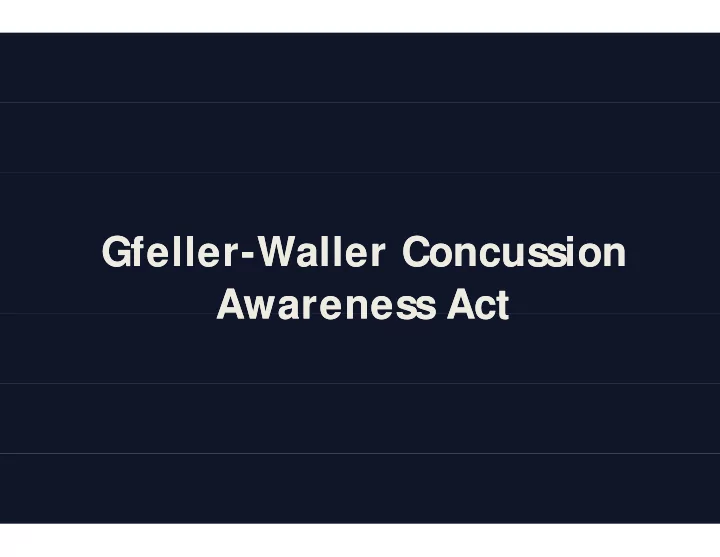

Gfeller Waller Conc ssion Gfeller Waller Conc ssion Gfeller-Waller Concussion Gfeller-Waller Concussion Awareness Act Awareness Act Awareness Act Awareness Act
Youth Sports & Concussion Laws Youth Sports & Concussion Laws S Sports Concussion Legislation t C i L i l ti • Essential components – Education (athletes, parents, coaches). – Instituting a concussion policy and emergency action plan. – Removal from practice or play at the time of suspected R l f ti l t th ti f t d concussion. – Medical evaluation and return to play clearance by a health p y y care provider with training in concussion management.
What is the Gfeller-Waller Concussion Awareness Act? Awareness Act? • A law that was implemented to protect the safety of A law that was implemented to protect the safety of student-athletes in the state of North Carolina • S igned into law by Governor Beverly Purdue on June 16, 2011. • Areas of focus: – Education – Emergency action and postconcussion protocol implementation – Clearance and return-to-play after concussion
Matthew Gfeller and Jaquan Waller
What is a concussion? A concussion is an inj ury to the brain caused by a direct or indirect blow to the head. It results in your brain not working like it should. It may or may not cause you to black out or pass out. It y y p can happen to you from a fall, a hit to the head, or a hit to the body that causes your head head, or a hit to the body that causes your head and your brain to move quickly back and forth.
What are the signs and symptoms of concussion? f
What problems can result from a concussion? concussion? • Problems with school work • Problems with school work • If returned-to-play too early after a concussion, If d l l f i individuals may have ongoing sadness, not feel like yourself, or have trouble remembering things for a lf h t bl b i thi f long time • Once you have a concussion you are more likely to y y y have another concussion
What student-athletes should know • You should tell your coach, your parents, and a medical professional if one is available if you think medical professional if one is available if you think you have a concussion. • You should not have any symptoms at rest or during/ after activity when you return to play as this during/ after activity when you return to play, as this is a sign your brain has not recovered from the inj ury. • You need to be evaluated and cleared by a medical professional trained in concussion management before professional trained in concussion management before returning to your activity or sport.
What parents should know • If your child has any signs and symptoms of a concussion f hild h i d f i they should be evaluated by a medical professional trained in concussion management in concussion management • Your child should never return-to-play while still Your child should never return to play while still experiencing signs and symptoms of concussion • If your child has a headache that gets worse over time, experience loss of coordination or abnormal body experience loss of coordination or abnormal body movements, have repeated nausea, vomiting, slurred speech, or you witness what you believe to be a severe p , y y head impact, you should refer them to appropriate medical personnel immediately.
What coaches and school personnel should know should know • If you suspect one of your student-athletes is exhibiting signs and symptoms consistent with exhibiting signs and symptoms consistent with a concussion, they should be removed from play immediately and not allowed to return play immediately and not allowed to return on that same day • All student-athletes exhibiting signs and symptoms consistent with concussion have to h h have written clearance from a medical professional trained in concussion f i l i d i i management prior to returning to play
What medical professionals should know Concussion management training can be found at: Concussion management training can be found at: h http:/ / www.cdc.gov/ concussion/ headsup/ clinicians. / / d / i / h d / li i i html? source=govdelivery
A culture shift has been set in motion… and Carolina is making a difference Carolina is making a difference – Concussion education is key – Know “ red flags ” for a situation turning catastrophic “ d fl g ” f K it ti t i g t t hi – Establish an obj ective comprehensive evaluation & standardized RTP protocol ( graduated exertional exercises ) d d d l – Think beyond the acute trauma y – Equipment safety & behavior modification – S tate laws will make a difference!
Recommend
More recommend